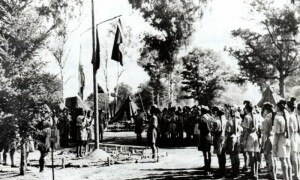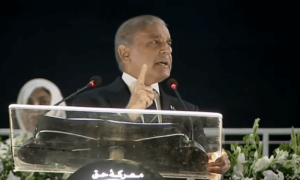WHILE Pakistan and India were caught in an ‘escalation dominance’ spiral last week, Islamabad received some good news. Despite Indian efforts to derail the IMF facility, the next drawdown was approved, along with an additional $1.4 billion disbursement to support climate resilience.
The additional financing under the IMF’s Resilience and Sustainability Facility aims to build resilience against natural disasters and growing climate vulnerabilities. The facility acknowledges Pakistan’s water scarcity, and prioritises investment in water efficiency, climate mitigation efforts and better coordinated responses to natural disasters such as floods and drought. Given Pakistan’s ranking as the fifth-most climate vulnerable country, the facility is timely. But it also highlights how an increasingly fragmented world behaves incoherently.
The climate resilience facility has been announced at a time when Pakistan is grappling with India’s decision to suspend the Indus Waters Treaty (IWT), a development not immediately addressed by the ceasefire declared on Saturday. As Khurram Hussain recently outlined in these pages, the suspension is not a short-term, knee-jerk reaction to Pahalgam. Rather, it is part of a well-planned slow creep to renege on treaty commitments and control the Indus flows at the cost of Pakistan’s agricultural heartland and those sustained by it. And yet, the international response to the suspension has been tepid.
Consider the big picture: does it make sense for international institutions to prop up Pakistan’s climate resilience efforts while the countries that govern and fund these institutions are failing to promptly address threats to the IWT, a truly existential concern for our country?
Calls for increased coherence in international policymaking are by no means new. But even while institutions such as the IMF, MDBs and trade organisations better coordinate approaches, incoherence seems to be an increasing global feature. It will be exacerbated with the weakening of international institutions and the growing global resignation to blatant violations of international law and norms as exhibited by nations such as Israel and Russia, which act with relative impunity.
Take, for example, the right-wing spurring anti-immigration drives across the West. These are willing to toss out democratic regard for due process, humanitarian considerations and constitutionally enshrined rights in order to rid Western countries of immigrants. But anti-immigration policies are deployed with little consideration for push factors. In 2022, the UNHCR reported that around 84 per cent of refugees and asylum seekers to the West came from highly climate-vulnerable countries, up from 61pc in 2010. And yet, we find ourselves in a world where immigrants in the West are demonised at the same time that major industrial superpowers walk away from climate commitments, and the US slashes USAID, which was providing jobs, health support and economic and climate resilience for millions.
Incoherence becomes more dangerous at the national level.
Incoherence becomes more dangerous at the national level, as that renders foreign policymaking and diplomacy impossible. In the light of recent tensions, let’s consider India’s example.
Writing for Chatham House, Dr Chietigj Bajpaee has argued that India’s foreign policy ambitions include positioning itself as a vishvamitra (friend to the world). He argues this positioning led to the inclusion for the first time in 2023 of the African Union to the G20 during India’s presidency “amid the country’s efforts to project itself as a voice for the Global South”. But what Global South partner will trust India as it weaponises water?
Pakistan is not the only one anxious about India’s approach to securing its own water supply. The Ganges Water Treaty which ensures Ba-
ngladesh receives a minimum river flow via India is due to expire in 2026, and Dhaka is concerned about how renegotiations will be broached. India also has several water treaties with Nepal, which have been poorly implemented. If the IWT, one of the greatest examples globally of water diplomacy, does not endure, all regional countries — including upstream China — will be forced to plan paths to water security that do not require relying on Indian cooperation. This scenario does not cohere with India’s aspirations to be a rising power and champion of the Global South.
In a zero-sum world where the rules-based order is collapsing, it may be more effective to reprioritise coherence, a gentler ask than cooperation, transparency, inclusion or accountability. Coherence may not result in the best outcomes if key stakeholders are disinclined to achieve those but it will at least offer a modicum of predictability. These past few tense days have highlighted the value of that, if nothing else.
The writer is a political and integrity risk analyst.
X: @humayusuf
Published in Dawn, May 12th, 2025










































